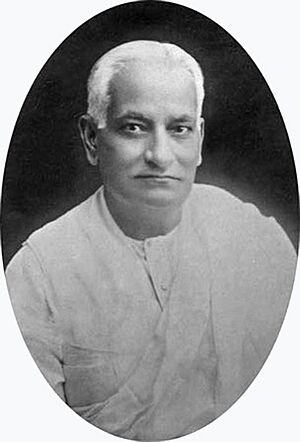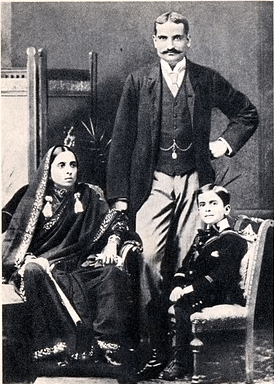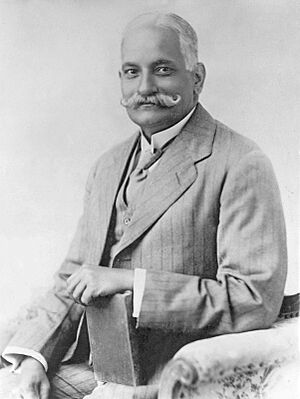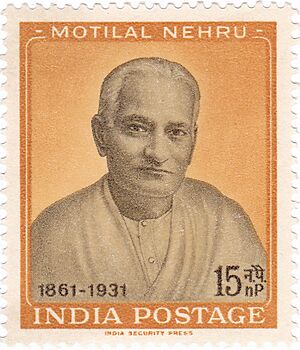Motilal Nehru facts for kids
Quick facts for kids
Pandit
Motilal Nehru
|
|
|---|---|

Nehru in the 1910s
|
|
| President of the Indian National Congress | |
| In office 1919–1920 |
|
| Preceded by | Syed Hasan Imam |
| Succeeded by | Lala Lajpat Rai |
| In office 1928–1929 |
|
| Preceded by | Mukhtar Ahmed Ansari |
| Succeeded by | Jawaharlal Nehru |
| Personal details | |
| Born | 6 May 1861 Agra, North-Western Provinces, British India (present-day Uttar Pradesh, India) |
| Died | February 6, 1931 (aged 69) Lucknow, United Provinces, British India (present-day Uttar Pradesh, India) |
| Spouse | Swarup Rani Thussu |
| Children |
|
| Alma mater | Muir Central College |
| Occupation | |
Motilal Nehru (born May 6, 1861 – died February 6, 1931) was an important Indian lawyer, activist, and politician. He was a key leader in the Indian National Congress, a major political party. He served as the Congress President two times: from 1919 to 1920 and again from 1928 to 1929. Motilal Nehru was also the father of Jawaharlal Nehru, who became India's first Prime Minister. He is considered a leading figure of the famous Nehru-Gandhi family.
Contents
Early Life and Education
Motilal Nehru was born on May 6, 1861, after his father, Gangadhar Nehru, had passed away. His father had been a police officer in Delhi.
Motilal spent his childhood in Khetri, which was a large feudal estate in the princely state of Jaipur (now in Rajasthan). His older brother, Nandlal, became a trusted advisor and chief minister for the ruler of Khetri.
After the ruler died, Nandlal moved to Agra. He realized he could help people with their legal problems. He studied hard and passed the exams to become a lawyer in the British courts. Later, the High Court moved to Allahabad, and the family moved there too.
Motilal and his brothers learned to speak English as teenagers. Motilal was also very good at Arabic, Persian, and Urdu.
Motilal Nehru's Career
Motilal passed his law exams in 1883 and started practicing law in Kanpur. Three years later, he moved to Allahabad to join his brother Nandlal's successful law practice. Sadly, his brother died in 1887 at age 42. This meant Motilal, at just 25, became the main person supporting his large family.
Motilal became very well-known in Allahabad's legal community. He handled many civil cases, often for wealthy land-owning families. In 1900, he bought and rebuilt a large family home in the city, naming it Anand Bhavan, which means "Joy House."
In 1909, he reached the top of his legal career. He was allowed to argue cases in the Privy Council in Great Britain, which was the highest court for British colonies.
Motilal also helped start The Leader, a major newspaper in Allahabad. Later, in 1919, he launched his own newspaper, The Independent.
Around 1918, Motilal was greatly influenced by Mahatma Gandhi. He began to change his lifestyle, giving up Western clothes and goods for a more traditional Indian way of living.
His family home, Swaraj Bhavan, became a very important place for India's fight for freedom. It was once owned by Sir Syed Ahmad Khan, a Muslim leader. Motilal bought it in 1900, and it became a center for the Indian independence movement.
Political Journey
Motilal Nehru was elected President of the Indian National Congress twice. The first time was in Amritsar in 1919, and the second time was in Calcutta in 1928.
The Jallianwala Bagh massacre in 1919 deeply affected him. This event, where many peaceful protestors were killed, made him very angry. In December of that year, he led the Amritsar Congress meeting.
Motilal strongly supported Mahatma Gandhi's Non-Cooperation Movement. This movement encouraged Indians to peacefully refuse to cooperate with British rule. He was arrested during this time. However, he disagreed with Gandhi when the movement was stopped in 1922 after a violent incident in Chauri Chaura.
Motilal later joined the Swaraj Party. This party wanted to enter the British-controlled councils to challenge British rule from within. He was elected to the Legislative Council in the United Provinces. He even led the first "walk-out" in protest when a resolution he proposed was rejected.
In 1923, Nehru was elected to the Central Legislative Assembly in New Delhi. He became the leader of the opposition, working to delay or defeat laws proposed by the British.
In March 1926, Nehru asked for a meeting to create a constitution for India. He wanted India to have "Dominion Status," meaning it would be self-governing but still part of the British Empire. This idea was rejected, so Nehru and his colleagues resigned from the Assembly and returned to the Congress party.
Motilal's son, Jawaharlal Nehru, became involved in politics in 1916. This marked the beginning of a very powerful political family in India. In 1929, Jawaharlal was elected Congress President, taking over from his father. This was a proud moment for the Nehru family.
The Nehru Report
In 1928, Motilal Nehru led the famous Nehru Commission. This was set up to create an Indian constitution as a response to the all-British Simon Commission. The Nehru Report was the first constitution written entirely by Indians. It suggested that India should have "Dominion Status," similar to countries like Australia and Canada.
The Indian National Congress supported this report. However, some Indian nationalists wanted complete independence, not just Dominion Status. Muslim leaders, especially Muhammad Ali Jinnah, also rejected the report. They worried it didn't protect the rights of Indian Muslims enough.
Death and Legacy
Motilal Nehru's health declined in his later years. He was not able to be as active in the major events of 1929–1931, when the Congress decided to fight for complete independence and Gandhi launched the Salt Satyagraha.
He was arrested and put in prison with his son, but his health worsened, and he was released. In January 1931, Gandhi and other Congress leaders were also released. Motilal had the comfort of having his son and Gandhi by his side in his final days. He passed away on February 6, 1931.
Motilal Nehru is remembered as the head of India's most influential political family. This family has given India three Prime Ministers. His great-great-grandsons, Rahul Gandhi and Varun Gandhi, are currently members of the Indian Parliament.
Tribute to Motilal Nehru
Sir Grimwood Mears, the British Chief Justice of the Allahabad High Court, spoke highly of Motilal Nehru:
He had many talents, and as a lawyer, he was excellent at presenting his cases in the best way. He had a wonderful public speaking voice and a charming manner that made it a joy to listen to him. With his wide reading and love for travel, he was a very delightful companion. Wherever he sat at a table, he was the center of attention. He has left a great reputation in this court, and his name will always be connected with its traditions.
Works by Motilal Nehru
- The Voice of Freedom: Selected Speeches of Pandit Motilal Nehru. ed. Kavalam Madhava Panikkar, A. Pershad. Asia Pub. House, 1961
- Motilal Nehru: Essays and Reflections on His Life and Times, by Preet Chablani. S. Chand, 1961.
- Selected Works of Motilal Nehru (volumes 1–6), ed. Ravinder Kumar, D. N. Panigrahi. Vikas Pub., 1995. ISBN: 0-7069-1885-1.
Biographies
 | Tommie Smith |
 | Simone Manuel |
 | Shani Davis |
 | Simone Biles |
 | Alice Coachman |




